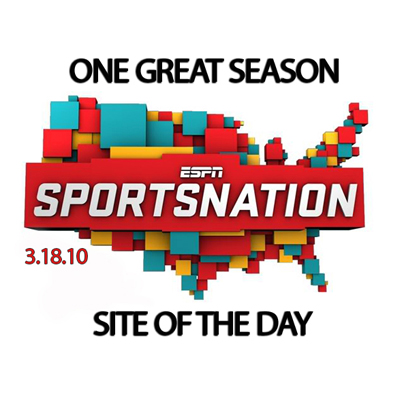Blacks In Sports: Networking & Relationships
 Thursday, February 17, 2011 at 12:38AM
Thursday, February 17, 2011 at 12:38AM
By JOHN P. WISE
One Great Season
Are you going to tonight's social meet-up? Did you go to that media mixer on Monday?
For those who embrace modern networking, there are plenty of ways to connect with like-minded folks in your field as you seek a better job and, possibly, a better life. You might even have something planned for tonight.
Don't forget your business cards.
But what if you're an aspiring black football or basketball coach? Or an aspiring Major League Baseball executive? There's no weekly or monthly happy hour where hopeful climbers can gather conveniently and pass contact information around. And what if it was still the 1990s? Networking events like the ones we frequent today weren't nearly as common as they were 20 years ago. Or even 10.
As blacks have been getting more jobs in most sports the last decade or so, the conversation has shifted. The question is less about whether they're getting jobs. Now, we're asking if they're getting good jobs? Are they getting jobs after being fired, as many white coaches do?
The next step in the evolution of the black coach or executive is really only the second step. His history is so new that there's one factor affecting him far more than it affects his white counterpart. Sure, qualifications are obviously important, but getting past the front door to pitch those credentials to a prospective employer isn't terribly easy.
"Relationships are critical," said Yale football coach Tom Williams, who last month was passed over for the job at Stanford when the Cardinal hired David Shaw, the school's third black football coach. "The reality is that the folks who are doing the hiring for these positions are a very homogenous group. They're mostly older, white males. Like probably anything in life, we tend to be more comfortable with folks who look like us or folks we're around more. For a long time, that was one of the major issues for black coaches. But the NCAA has done a great job with their programs to help initiate contact between emerging black coaches and athletic directors and university presidents. And there's now dialogue and discussion that give young black coaches an opportunity in that way."
Stanford isn't the only PAC-10 school with an open mind in this area, a fact that hasn't gone unnoticed or unappreciated by University of Washington basketball coach Lorenzo Romar.
"At one time, myself, Tia Jackson and Tyrone Willingham were all coaches of revenue sports teams," he said. "I thought that was pretty good. It told me that no one here sees race at this point."
AOL FanHouse columnist Terence Moore recalled a story from early in his journalism career, when San Francisco Giants skipper Frank Robinson, who after a Hall-of-Fame playing career became the first black manager in MLB history, made a memorable point about that homogenous group Williams described above.
"Frank told me something back in 1981 that I'll never forget," Moore said. "He said the reason there aren't any black managers in baseball is because owners want to hire people they're comfortable having breakfast with. It was a great line."
But 2011 is a far cry from 1981. In 30 years, many if not most team owners and university decision-makers have learned to enjoy breakfast with black coaches and executives. And lunch and dinner. And winning games and generating revenue.
Jeep Hunter, an assistant football coach at the University of South Carolina, served an NFL Minority Internship in 2001 that he thought was valuable for multiple reasons.
"Not only did it help me broaden my knowledge, but it also gave me a chance to make some new friendships with some coaches who I wouldn't have been able to interact with otherwise," he said.
Minority internships serve their purpose and all, but Williams said it's time for both sides to think bigger.
"Now, the next step is for black coaches to get re-hired, and to start getting some of those cream-of-the-crop type jobs that our white counterparts are getting," Williams said.
Sounds good on paper, but how do we get there?
ESPN personality Jemele Hill, who wrote an eye-opening column on black NFL quarterbacks last fall, said it comes down to a lack of relationships. Some roots are down, but the network needs time to grow.
"We're not talking about people walking around with hoods," she said. "We're just talking about how a system was set up and it takes a while for changes to be made. Whoever is doing the hiring, they have got to feel like there's some commonality with someone they're hiring, and that person must appeal to the fans, the majority of whom are white. That's where sometimes African-American candidates can be left behind."
The absence of an established network hurts not only the up-and-coming hot shot looking for his first head coaching job, but also the once-fired guy looking to catch on somewhere else.
"When you look at black coaches who get fired vs. white coaches, take a look at how many of them get hired again," Romar said. "I think the whites get re-hired at a higher rate than the blacks. I'm guessing it's quicker for them to get a second chance."
Romar added that he knows a lot of white guys in basketball who grew up with their dads as their coaches.
"Whites develop relationships with whites over many years," he said. "Some of them go on to become coaches, and then, later on, those coaches become athletic directors." Poof! The white network just appointed a new general.
That the percentage of black NBA and NFL coaches is far lower than the percentage of black players in both sports is rooted in a slow-to-evolve system. That evolution requires the shattering of some ceilings, rarely a simple feat. And until blacks own pro sports teams, particularly in the NFL, you'll continue to see Ryans and Schottenheimers and Moras prowl the sidelines thanks in part to having dads who worked in the league for so many years before them.
"You have whites who get those coaching opportunities who often come from coaching pedigree," said Dr. Harry Edwards, the prominent sociologist, author and professor whose opinions on the role of race in American sports have spanned nearly 50 years. "They've had relatives who coached, they come from coaching families. You don't find blacks getting those kinds of opportunities because they don't have that kind of pedigree."
That's partly why the NFL installed the Rooney Rule in 2003. It requires all teams to interview at least one black candidate for every head coaching and coordinator job.
"The Rooney Rule is in play in order to, for lack of a better term, artificially expose front offices and those who are making hiring decisions to black candidates in the absence of a calculus that says there's a definitive advantage in having diversity in this regard," Edwards said. "Now whether or not the person is simply getting a college tour or a serious interview is something that has to be considered on a case-by-case basis."
There are mixed opinions on the Rooney Rule, and in some circles it's a hotly debated topic. But to those who doubt its legitimacy, Edwards said he knows of at least two cases where an NFL owner was poised to hire a white head coach only to be so impressed by the black candidate he was interviewing to fulfill the Rooney obligation, that he hired the black coach.
And in a third case, "the owner had absolutely no concept of hiring a minority but wound up hiring one, not as a result of interviews this time, but interviews the last time, when he hired the white coach but remembered the interview that he had with the black candidate and went looking for him when he eventually let the (white coach) go."
So if there's not an immediate reward in terms of getting that coveted coaching job, the value is in the growth of the candidate's network. The interview Edwards described above not only allowed the black coach a chance to showcase his intellect, philosophy and style, but it also planted the seed of what proved to be a fruitful relationship, at least temporarily.
The spirit of the Rooney Rule is in the right place. In a culture that lets the end justify the means, those who are critical of the rule find the fault in the fact that it needs to exist in the first place.
Check back for Friday's Part V: "The Means Is The End."
Previous "Blacks In Sports" installments:
+ Part I: Remembering The History
+ Part II: The Hall Pass
+ Part III: The Summer Of LeBron
 Blacks In Sports,
Blacks In Sports,  OGS Special Reports
OGS Special Reports 













Reader Comments (3)
Another great post, OGS. Owners of pro franchises are one thing, but university presidents and boosters seem to be quite another. We routinely see how the NFL influences NCAA football in commercial, exploitative ways, but proportionately, black college coaches (head coach or otherwise) amount to a fraction of their pro counterparts. I wonder what it is. (Well, I don't really wonder what it is, to be honest.) No black head coach has ever achieved success with a major college program. Contrast that with the NFL's four men who've led teams to the Super Bowl — most impactfully, Dungie v. Smith in SB XLI — and it seems virtually impossible to believe the college game will ever catch up. And now, as long as the NFL's a much more tolerant, diverse employment arena, why would a man of color even want to stop in the college ranks? May as well get to the big leagues as quickly as possible and bypass the b.s. One of the more interesting notes about the Super Bowl a few weeks back (and most supportive of my point) — unlike a few years ago, I don't remember hearing anyone in the media refer to Tomlin as a "black coach." Contrast that with the '07 Super Bowl, when seemed as if it were the only story. It's hardly ironic that when billions of dollars are at stake, the league becomes what sports ought to be: a meritocracy. And no one can be bothered with something like race when there are Lombardi Trophies and multi-million-dollar ensorsement, merchandise, and season-ticket revenues at stake. All this while colleges are supposed to be our beacons of open-mindedness and the embodiment of our most noble pursuit.
It was really a good, have I like information!
Abercrombie
Abercrombie & Fitch
Abercrombie and Fitch
Abercrombie Deutschland
I'll come to this website message
Abercrombie Fitch Deutschland
Abercrombie & Fitch Deutschland
Abercrombie and Fitch Deutschland
Hollister Deutschland
Hollister Frankfurt
Love those! I enjoy following your posts on facebook and rss! yyjfbi yyjfbi - mulberry bags uk.